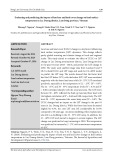
Temperature scales
-
Land use and land cover (LULC) change is a key factor influencing land surface temperature (LST) dynamics. This change reflects partly global warming and climate change at local and regional scales. This study aimed to evaluate the effect of LULC on LST change in Lac Duong mountainous district, Lam Dong province in the past 10 years (2013 - 2023), and predict the LST change in 2030.
 16p
16p  tuetuebinhan000
tuetuebinhan000
 23-01-2025
23-01-2025
 5
5
 2
2
 Download
Download
-
Bài giảng Kỹ thuật nhiệt - Chương 1: Những khái niệm cơ bản trang bị cho sinh viên những kiến thức cơ bản như: Đối tượng, phạm vi/quan điểm nghiên cứu của nhiệt động học; hệ thống (nhiệt), hệ kín, hệ hở, hệ cô lập; chất môi giới, tính chất, sự cân bằng, trạng thái, quá trình; đơn vị, thứ nguyên, hệ SI;… Mời các bạn cùng tham khảo.
 30p
30p  lovebychance07
lovebychance07
 12-07-2021
12-07-2021
 67
67
 6
6
 Download
Download
-
The focus of this study is to investigate its optical and conductive properties under different conditions of doping environments, temperature and polymerization conditions. Optical characterization technique such as UV-Visible spectroscopy is developed to carry out the investigation. The developed nanofibers have been demonstrated to possess optical and conductive properties to be dependent on doping variables. Study of these optical properties could prove very useful in the development of electrochromic devices and gas sensors.
 103p
103p  runthenight07
runthenight07
 01-03-2023
01-03-2023
 13
13
 3
3
 Download
Download
-
This process periodically speeds up the corrosion of the zirconium cladding in the aqueous coolant due to the breakaway of the dense part of oxide scale when its thickness reaches 2 mkm. It is shown that the electronic resistivity of zirconia is not limiting the zirconium oxidation at working temperatures.
 5p
5p  christabelhuynh
christabelhuynh
 30-05-2020
30-05-2020
 13
13
 2
2
 Download
Download
-
THERMODYNAMIC MODELING, ENERGY EQUIPARTITION, AND NONCONSERVATION OF ENTROPY FOR DISCRETE-TIME DYNAMICAL SYSTEMS WASSIM M. HADDAD, QING HUI, SERGEY G. NERSESOV, AND VIJAYSEKHAR CHELLABOINA Received 19 November 2004 We develop thermodynamic models for discrete-time large-scale dynamical systems. Specifically, using compartmental dynamical system theory, we develop energy flow models possessing energy conservation, energy equipartition, temperature equipartition, and entropy nonconservation principles for discrete-time, large-scale dynamical systems.
 44p
44p  sting12
sting12
 10-03-2012
10-03-2012
 58
58
 7
7
 Download
Download














